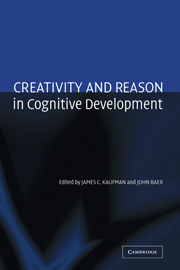Book contents
- Frontmatter
- Contents
- List of Contributors
- Acknowledgments
- Creativity and Reason in Cognitive Development
- Introduction
- COGNITIVE PERSPECTIVES
- DEVELOPMENTAL AND EDUCATIONAL PERSPECTIVES
- 12 Creativity in Young Children's Thought
- 13 A Young Artist's Story: Advancing Knowledge and the Development of Artistic Talent and Creativity in Children
- 14 Is It Reasonable to Be Creative?
- 15 Does Culture Always Matter: For Creativity, Yes, for Deductive Reasoning, No!
- 16 Higher Level Thinking in Gifted Education
- 17 The Relationship Among Schooling, Learning, and Creativity: “All Roads Lead to Creativity” or “You Can't Get There from Here”?
- 18 How Early School Experiences Impact Creativity: An Ecological Perspective
- 19 Conclusions
- Author Index
- Subject Index
- References
14 - Is It Reasonable to Be Creative?
Published online by Cambridge University Press: 19 January 2010
- Frontmatter
- Contents
- List of Contributors
- Acknowledgments
- Creativity and Reason in Cognitive Development
- Introduction
- COGNITIVE PERSPECTIVES
- DEVELOPMENTAL AND EDUCATIONAL PERSPECTIVES
- 12 Creativity in Young Children's Thought
- 13 A Young Artist's Story: Advancing Knowledge and the Development of Artistic Talent and Creativity in Children
- 14 Is It Reasonable to Be Creative?
- 15 Does Culture Always Matter: For Creativity, Yes, for Deductive Reasoning, No!
- 16 Higher Level Thinking in Gifted Education
- 17 The Relationship Among Schooling, Learning, and Creativity: “All Roads Lead to Creativity” or “You Can't Get There from Here”?
- 18 How Early School Experiences Impact Creativity: An Ecological Perspective
- 19 Conclusions
- Author Index
- Subject Index
- References
Summary
Reasoning refers, in general, to the act of thinking based on inductive and deductive processes. It is often associated, more specifically, with the process of developing and supporting assertions, claims, proposals, or conclusions (Reber, 1995). It provides, in many cases, the basis for action or decisions. The development of reasoning is often viewed as an important educational goal. In this chapter, we focus on the relation between reasoning and another aspect of cognition that has been gaining increasing attention, namely creativity.
Creativity can be defined as the capacity to produce novel, original work that fits within task constraints (Lubart, 1994). Work refers to all types of ideas and productions. This work must be novel in the sense that it goes beyond a replication or copy of that which exists. The extent to which the work produced is novel can vary from being original only for the person who completed the work (this is the notion of reinventing ideas known already in the larger social context) to being original for a limited social group to being original for all of humanity. The second component in the definition concerns the fit with constraints. We distinguish creative ideas from bizarre ideas, which are also novel, because creative ideas take into account the parameters of a situation, the constraints. Novel productions that are in some way “useful” or “reasonable” in a given context are, thus, creative.
We explore possible links between the development of reasoning and the development of creativity in children and adults.
Information
- Type
- Chapter
- Information
- Creativity and Reason in Cognitive Development , pp. 269 - 281Publisher: Cambridge University PressPrint publication year: 2006
References
Accessibility standard: Unknown
Why this information is here
This section outlines the accessibility features of this content - including support for screen readers, full keyboard navigation and high-contrast display options. This may not be relevant for you.Accessibility Information
- 7
- Cited by
